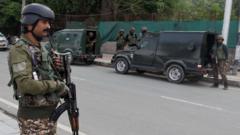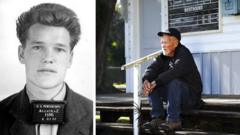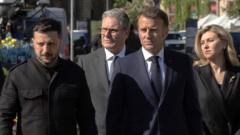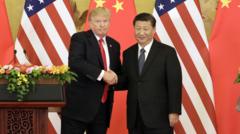In a surprising statement delivered during a late-night address from the Kremlin, Putin emphasized the need for serious discussions aimed at resolving the underlying issues of the ongoing conflict and achieving sustainable peace.
Putin Proposes Immediate Dialogue with Ukraine Amidst Ongoing Conflict
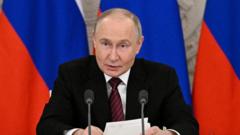
Putin Proposes Immediate Dialogue with Ukraine Amidst Ongoing Conflict
Russian President Vladimir Putin has urged for "direct talks" with Ukraine to commence without delay, hinting at a diplomatic path forward.
In a rare televised address on Saturday, Russian President Vladimir Putin called for negotiations with Ukraine, proposing that "direct talks" should begin as soon as May 15. He expressed a desire for substantial discussions that would tackle the conflict's root causes and help pave the way for lasting peace. This appeal for dialogue comes shortly after a visit from European leaders, including UK Prime Minister Sir Keir Starmer and French President Emmanuel Macron, who urged Russia to agree to an unconditional 30-day ceasefire.
Kremlin spokesperson Dmitry Peskov noted that while Moscow will contemplate the proposition, it is unyielding to external pressure. Putin, in his televised statement, did not dismiss the possibility of agreeing to new ceasefires during the proposed negotiations, which he suggested could take place in Istanbul.
Following the European leaders' visit to Kyiv, where they met with Ukraine’s President Volodymyr Zelensky, they collectively called on Russia for a ceasefire beginning immediately. This initiative reflected collaborative efforts articulated in discussions with U.S. President Donald Trump, who initially proposed an unconditional ceasefire, alongside stern warnings of "massive" sanctions against Russia should it disregard the demands.
Sir Keir Starmer reiterated the stance of the allied leaders, stating, "If he is serious about peace, then he has a chance to show it." Zelensky expressed gratitude towards the supportive European leaders, emphasizing a unified commitment to establishing secure and sustainable peace.
Putin, however, characterized the notion of peace amid continued military buildups as problematic, questioning, "Who needs peace like that?" He accused Ukraine of neglecting multiple previous ceasefire proposals, which Ukraine countered by citing persistent Russian attacks throughout these alleged ceasefire periods.
This latest call for negotiations marks a significant moment, as the last direct talks occurred shortly after Russia initiated its full-scale invasion of Ukraine over three years ago. Putin concluded his address by restating Moscow's willingness to resume discussions with Kyiv unconditionally, emphasizing the importance of diplomacy in resolving the ongoing conflict.
As tensions remain high and the situation evolves, both sides face critical decisions that could influence the outcomes of their discussions and affect the broader geopolitical landscape.
Kremlin spokesperson Dmitry Peskov noted that while Moscow will contemplate the proposition, it is unyielding to external pressure. Putin, in his televised statement, did not dismiss the possibility of agreeing to new ceasefires during the proposed negotiations, which he suggested could take place in Istanbul.
Following the European leaders' visit to Kyiv, where they met with Ukraine’s President Volodymyr Zelensky, they collectively called on Russia for a ceasefire beginning immediately. This initiative reflected collaborative efforts articulated in discussions with U.S. President Donald Trump, who initially proposed an unconditional ceasefire, alongside stern warnings of "massive" sanctions against Russia should it disregard the demands.
Sir Keir Starmer reiterated the stance of the allied leaders, stating, "If he is serious about peace, then he has a chance to show it." Zelensky expressed gratitude towards the supportive European leaders, emphasizing a unified commitment to establishing secure and sustainable peace.
Putin, however, characterized the notion of peace amid continued military buildups as problematic, questioning, "Who needs peace like that?" He accused Ukraine of neglecting multiple previous ceasefire proposals, which Ukraine countered by citing persistent Russian attacks throughout these alleged ceasefire periods.
This latest call for negotiations marks a significant moment, as the last direct talks occurred shortly after Russia initiated its full-scale invasion of Ukraine over three years ago. Putin concluded his address by restating Moscow's willingness to resume discussions with Kyiv unconditionally, emphasizing the importance of diplomacy in resolving the ongoing conflict.
As tensions remain high and the situation evolves, both sides face critical decisions that could influence the outcomes of their discussions and affect the broader geopolitical landscape.











